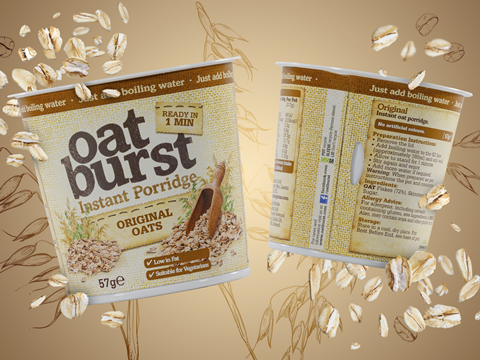
Food producer Symington’s has been using Greiner Packaging’s K3 cardboard-plastic solution for its Naked instant noodles since 2021, and is said to be the ‘first UK food producer’ to move its Oatburst instant porridge brand to Greiner Packaging’s K3 r100 self-separating, designed-for-recycling variant.
The K3 cardboard-plastic cup features a tear-tab so that consumers can separate the cardboard outer wrap from the lightweight plastic cup.
With the latest development, K3 r100, Greiner says the materials separate themselves before they reach the near-infrared detection (NIR) system at the recycling facility, leading to proper detection, sorting and recycling. K3 r100 is said to enable cardboard and plastic to be assigned to the correct material streams during the initial sorting process, before being recycled.
Greiner Packaging UK & Ireland sustainability and innovation manager, Rachel Sheldon, says: “The cardboard wrap and plastic packaging separate from each other without human intervention during the waste disposal process. This means that achieving a high recyclability rate (up to 98%) does not depend on proper separation by the end consumer – which was the case with all previous K3 packaging – as it now happens completely independently before the used packaging reaches the recycling facility.”
“Oatburst is ideal for people on the go, so we are delighted that however consumers dispose of the empty container when they have finished enjoying their instant porridge snack, the two packaging materials will self-separate to enable recycling during the waste disposal process,” adds Symington’s finance director Julian Wetton.
In January, Quaker Oats announced it was transitioning into paper packaging across its porridge pot range, aiming to streamline recyclability and remove a yearly estimate of up to 200 tonnes of plastic. The transition hoped to benefit consumers by ensuring that the whole pack can enter the same recycling stream, simplifying its disposal.
Colpac introduced its range of recyclable microwaveable soup pots in the same month, suitable for chilled and hot food-to-go. The souper pots range is said to include recyclable clear PP and PP coated paperboard lids.
If you liked this story, you might also enjoy:
How are the top brands progressing on packaging sustainability?
Sustainable Innovation Report 2024: Current trends and future priorities
Reuse vs. single use – which is better for the environment?
The ultimate guide to global plastic sustainability regulation














No comments yet